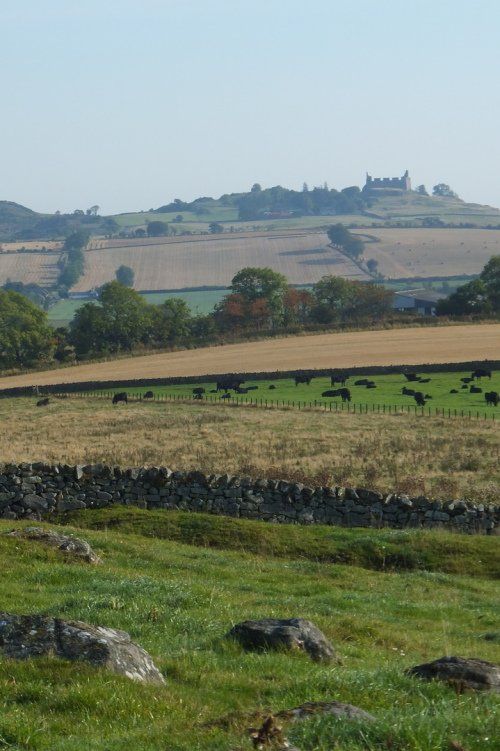Hardiesmill Farm
Hardiesmill is a family farm in the Scottish Borders, run by Robin and Alison Tuke, along with a small, dedicated and generally, very jolly team. Our core is: the herd of Pedigree Aberdeen Angus Cattle, 'Dog 2.0' (who keeps everyone in order), the Fairleys, (an awesome farmily who've been working at Hardiesmill since the 1940s) and a 482 acre (200 hectare) farm which we've put back into grass with the help of Johnny Watson Seeds.
Hardiesmill has been a farm since before 1560 (oldest record we've found so far). The chances are the field names (Bank, Waterside, Lurgies, etc) are as old. The land rises gently from 450 to 620 feet above sea level, whilst the soil comprises of a medium to light loam on a clay base. We have approximately 28.6 acres of woodland building and roads, the rest is now back in grass.
We have been experimenting with different grass varities over the last 18 years, to extend both the growing season and the resilence to the variations in the weather. All are species rich in order to be sustainable and to contribute to the flavour of the beef. We also retain our grass for longer in lays in order to increase its minerality, heathiness, carbon secrestation and goodness, which is paying dividents. Meanwhile we use straw from neighbouring arable farms as winter bedding for the cattle when we bring them in. We don't use pesticides and keep fertilizer to a minumum, in fact usually zero, preferring instead to use bee-friendly clover and other wild flowers & legumes through our grass.
We try and keep cattle outside on the grass throughout the year, though living in Scotland means this is not always possible. The cattle do not mind the cold, nor the wind, but nobody likes endless days of rain. So we bring them in if it is very wet to save the ground and to let the cattle enjoy a drier lie. They are bedded on straw courts and have free access to grass sileage/hay bales which are put in daily.
The calves are weaned when they reach about 10 months old, however, they are kept in the next door court to their mothers for a few weeks in order to keep stress to a minimum. They stay at Hardiesmill for all their lives, enjoying the unique grasses. We finish (grow) the cattle naturally without being force fed, just eating grass, grass-sileage and hay. They finish at 17-24 months. Heifers are bulled at 18 months if they are retained for breeding.
Hardiesmill tries to be sustainable. A buzz word! The muck from the winter quarters is used on the grass to give minerals, potash and potassium back to the soil The cows are naturally inseminated by five stock bulls we have at Hardiesmill. We try and calve so that the newborn is with its mother outside as soon as possible in the Spring to enjoy the outdoors life. Cows should calve naturally without assistance, and we only intervene if required. Likewise anti-biotic and steriod use is restricted to medicinal purposes only. Ie if a calf is sick, we will treat it in ordre to minimise suffering and quite possibly to save its life. It sounds all fluffy and cuddly, but we really do believe that if you have happy cattle, then life is so much better.
Hardiesmill Aberdeen Angus Herd History
A change of farming policies in 1987 meant the Thornton Herd was dispered. However, Nigel and Gaye Thornton-Kemsley needed grass grazers and selected females were brought back from various dipersals.
1998 Alison and Robin were offered both the cattle and the herd name. Circumstances dicated that the Thornton Ladies, as they became known, were brought before any land, so they headed south for a fwo year break at Begley Farm in the Home Counties. When Hardiesmill was purchased they headed north again.
Unfortunately, Nigel never saw the Herd head to Hardiesmill but was influential in the purchase of the first stock bull, Cardona Edwin Z043, a son of Lochdu Elfking, a Thornton bloodline, and the famous Cardona Edwin 7th, a fabulous show cow for Cardona.
In 2002, Alison transferred the Thornton Prefix back to her brother, Ian, when he wished to have Aberdeen Angus cattle back at Thornton, and renamed the herd, Hardiesmill. The blood lines remain at Hardiesmil.
The Thornton Lines continue to flourish at Hardiesmill, Palavas, Electives, Elfins and Ediths. These have been supplemented by purchase of cows from Blelack, Tofts, Chimes and Galcantray. Three homebred bulls including Hardiesmill Everite C016 (a son of Blelack Blackstock) plus bulls from Fordel, Strathinver and Dunloise have helped consolidate the herd to be a more standardised look and real growth off grass/grass-sileage currently Hardiesmill have 4 stockbulls.
The increase of the beef sales have meant that the herd is still expanding organically by retaining heifers. There is no quick fix but to ensure consistancy we won't buy in carcasses to supplement the beef requirements! Hardiesmill is trade marked name, all cattle and hence the beef is now born and reared on the farm.
If you are interested in the herd, please contact Alison Tuke on mail@hardiesmill.co.uk





